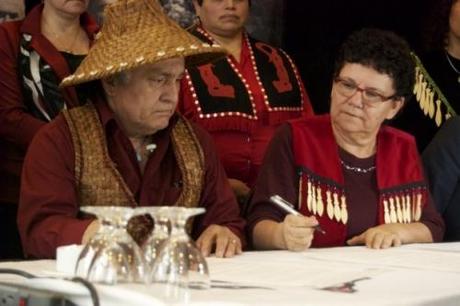
Cross Posted from Vancouver Observer
In the latest step toward opposing oil pipelines at every port in Canada, the Tsleil-Waututh Nation of Burrard Inlet signed on to the International Treaty to Protect the Sacred yesterday. The nation held a press conference at the Sheraton Wall Centre where newly elected Chief Maureen Thomas signed the document, witnessed by the president of the BC Union of Indian Chiefs Stewart Phillip and national chief of the Assembly of First Nations Shawn Atleo.
The West Coast Oil Pipeline Summit followed the signing. The theme of the event was urgency, with several leaders touching on the need to oppose development at a grassroots level.
Stewart Phillip told reporters and community members assembled that the First Nations of BC are committed to using the legal system to defend their constitutional rights, but that’s not the only strategy they’re using.
“More importantly, we have committed to standing shoulder to shoulder on the land itself.”
Atleo echoed Phillip’s fatigue with the justice system and spoke to the urgent nature of the struggle not just for Aboriginal land rights, but also for environmental protection for everyone.
“This is not just a North American moment you’re witnessing,” he said. “The tipping point we have reached is global.” He also spoke to the inadequacy of the legal avenues available to First Nations to settle land claims and hold the government accountable. He said he doesn’t want to see the courts clogged with cases.
“We don’t need to be pulled down into the weeds of whether consultation has happened.”
Tsleil-Waututh is the first nation whose territories are directly in the path of one of the proposed pipeline projects to sign the treaty. Phil Lane Jr., hereditary chief of the Yankton Sioux nation from South Dakota, said one of the key goals of the treaty is get signatures from all of the nations whose territories are directly affected.
The West Coast Oil Pipeline Summit brought together First Nations leaders from across the province as well as activists and business people from a handful of different alternative energy sectors.
The event was hosted by 2G Group of Companies, a consulting firm whose mandate is to help develop equitable relationships between Aboriginal and non-Aboriginal business ventures.
Economist Robyn Allan gave a keynote speech highlighting the Harper government’s extreme shifts in energy policy from the Kyoto Protocol and plans to limit bitumen exports to the current push to expand tar sands development. She criticized the message that the economy and the environment are on opposite sides of the debate.
“This is a fabricated trade-off designed to put ordinary Canadians against ordinary Canadians,” she said.
A panelist of five speakers discussed different facets of the tar sands debate from the economics of renewable energy development to the effects of climate change around the world.
Ben West, director of the tar sands campaign for Forest Ethics Advocacy, discussed the viability of alternative energy sources and the ways in which conventional methods of development—such as the construction of the Port Mann Bridge to relieve congestion—are often counter intuitive.
“If we could build our way out of congestions, LA would be the best city in the world to drive in,” he quipped. For the cost of the $3 billion bridge, he said, Vancouver could build streetcar infrastructure to serve the better part of the city.
“We’re talking about very real technology, very real solutions.”
Also in attendance was Green Party leader Elizabeth May, who stood up to talk about Monday’s vote in the House of Commons that will determine whether the Canada-China Foreign Investment Promotion and Protection Act (FIPA) will go through.
She said she was impressed by the breadth of information presented throughout the evening particularly fact about how Canada imports the condensate required to transport bitumen.
“I don’t think we’re hearing about it nearly enough that we’re creating dependency on Middle Eastern fossil fuels rather than upgrade it in Alberta and refine it in Alberta,” she said, adding that she’s not seeing the response she’d like from BC politicians.
“Where is Adrian Dix on this project? It does not seem that provincial NDP is opposed to this project and that’s a big problem.”
-With files from Jenny Uechi

